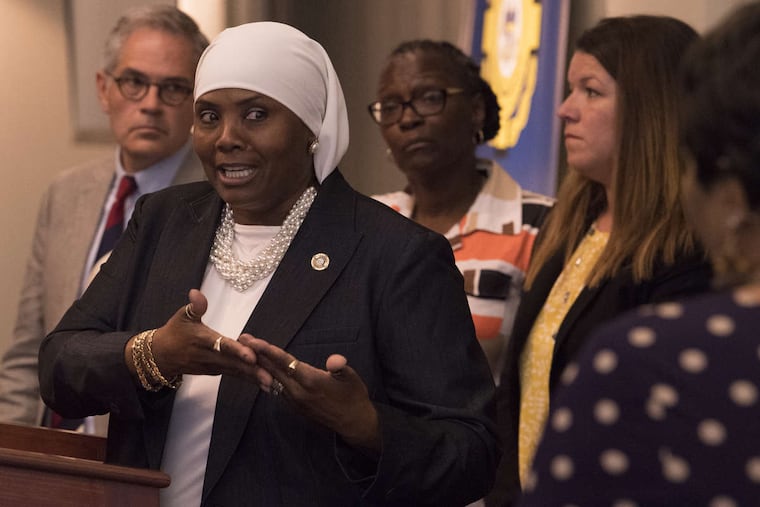D.A.’s Office: Under new program, crisis responders will immediately help homicide victims’ families
The new Philadelphia CARES program will help family members of homicide victims make funeral arrangements, manage the court system, and assist in other needs, authorities said.

Under a new program, the Philadelphia District Attorney's Office will provide immediate support to people whose loved ones are killed in a homicide, District Attorney Larry Krasner and victim-support advocates announced Wednesday.
The program, called Philadelphia CARES, is funded by a $1 million grant from the Pennsylvania Commission on Crime and Delinquency, Krasner said at a news conference. The grant will be administered by his office's Victim Witness Services Unit, and the funds will be shared with the Medical Examiner's Office and the Anti-Violence Partnership of Philadelphia.
The grant will allow the the D.A.'s Office to recruit, train, and deploy 12 peer crisis responders who have lost loved ones to homicide and who come from different ethnic backgrounds and neighborhoods, Krasner said.
The program is expected to launch after Labor Day, said Movita Johnson-Harrell, the head of the Victim Witness Services Unit. Her son Charles Andre' Johnson, 18, was fatally shot in 2011. She said the responders would be hired as contractors.
CARES stands for Crisis Assistance, Response, and Engagement for Survivors. After its program manager learns about a homicide from the Police Department, two peer crisis responders will be dispatched to speak to the victim's family members wherever they are — at the crime scene, a hospital, the Medical Examiner's Office, the Police Department, or the family's home, Johnson-Harrell said.
Those responders, she said, will try to notify family members that a loved one was killed, so that a homicide detective is not the one to relay the news.
"One thing that happens when you get the news that your loved one has passed is something literally breaks inside of your brain, and you are no longer the person that you were before this incident occurred," Johnson-Harrell said.
The responders will be available to assist the family with funeral arrangements, court hearings, food, and other needs, she said. Intensive support services will be provided for up to 45 days after the homicide, after which there will be a "soft handoff to one of our community-based agencies who will then work with that family to make sure that their needs are continued to be met," she said.
The responders will act as a bridge between the family members and the office's existing victim-witness coordinators and with victim-service agencies, she said.
The grant will allow the Medical Examiner's Office to hire a part-time social worker to provide grief counseling to family members on weekends and some holidays, Krasner said. It will allow the Anti-Violence Partnership of Philadelphia — which provides counseling services and legal aid and works with students in schools — to hire a full-time liaison to support the project and coordinate with the D.A.'s Office.
Jennifer Storm, the state's victim advocate, said at the news conference at the D.A.'s Office that she has heard "horrific" experiences of mothers of homicide victims after they were notified that loved ones were killed. The new program "will reduce victimization, will ensure that families are given one point of contact from the moment of the crime," she said. "They will immediately start crisis intervention."
One of the peer crisis responders will be Rafeeqah Sanders, whose daughter, Rose Daniels, was killed at age 27 in a 2011 domestic-violence incident.
"When I got that call, my whole world just stopped. I was just frozen," Sanders said at the news conference. "Nobody came into my home or called me to give me assistance."
The new program "is so needed," she said. "The initial trauma that I went through, I wish I had this program. I wish somebody was with me, who'd been through it, who said, 'Rafeeqah, how can I help you?' "